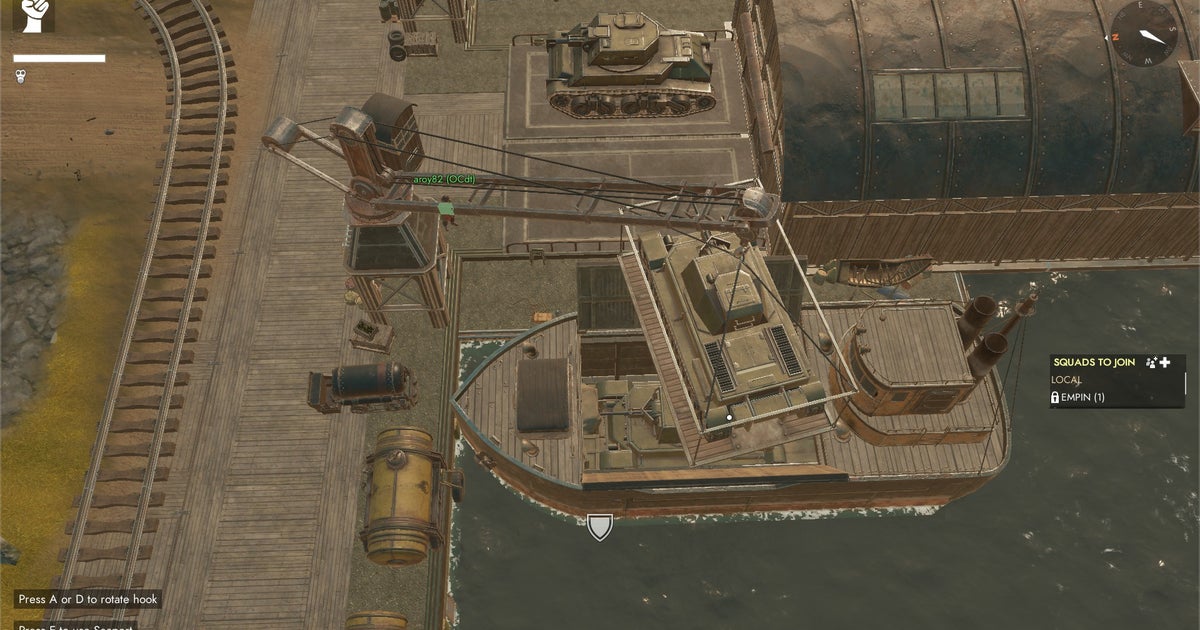Products You May Like
The worst part about strategy games is the shuffling. I give up on most 4Xs in the midgame, because shuffling more icons around is too wearying. No Total War since Medieval has truly enraptured me, because pathfinding for every army added nothing but hassle.
It’s why I love the model of Imperialism, where everywhere is one turn, no shuffling away. It’s also why I’m a little surprised how engrossing Foxhole is as a strategy game. As most players (including Brendy) will tell you, it’s a game all about shuffling, ie. logistics. But after finally making time for it, I’ve realised that most of them, even some of the “logi” focused players, don’t know what that actually means.
Foxhole is a top-down war MMO where players of two fixed factions shoot it out, and also drive trucks full of weapons to the front lines. It offers a remarkable degree of freedom, and even joining a war late, there’s always room for someone new, and a hundred ways to contribute. Each war lasts until one side occupies enough regions, which could in theory happen overnight or never, but generally last three or four weeks.
Everything in Foxhole is made by players, but where in EVE Online this means taking as much as you can for yourself, in Foxhole everything is for the war effort. Hoarding is categorically “Doing It Wrong”. It resembles Planetside 2 at times, but where resources in that are basically endless (and bases fixed), in Foxhole, if a front line is taken, everything behind it will go too if it’s unprepared. If the right ammo isn’t delivered, nobody can shoot back. Without some premeditated strategy, the most basic defence is impossible. Players cannot even spawn in a base without uniforms.
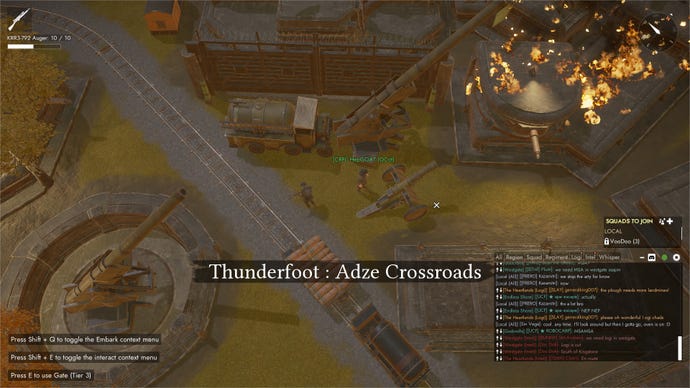
What makes Foxhole isn’t one thing or the other; it’s that everything is player made, everything goes towards a communal goal, and everything has to be prepared in advance, right down to the bullet. There aren’t abstracted logistics points. There’s just what you make, what you deliver, and what you anticipated. It matters because every player character is equal, with no skills or +5 legendary gear. Your limits are defined by what equipment others have made available, which anyone can do from scratch by gathering and refining everything themselves. But you don’t need to, because everything belongs to everyone.
Instead of the hyper-individualist approach of the crafting or survival game, 98% of your preparation is strategic, not personal. You provide for others, because sharing is the only way to achieve much, and both the means and goal of everything you do. Making all your own stuff is madness. Making stuff exclusively for yourself is madness and dickheadness. Community is a good strategy. It’s the strategy, in fact, that’s kept humans alive for a million years. Even in war, we only win when we trust in a greater effort, and help each other out. The extra things you leave for randos are possible because of extra things you took from randos. I once siphoned fuel from an ambulance. It was right.
Foxhole has no command structure. You’re not the all-powerful commander. Nobody is. All the gambits and invasions and organisation to support them require co-ordination from the ground up. And most remarkably of all, you can do this as a solo.
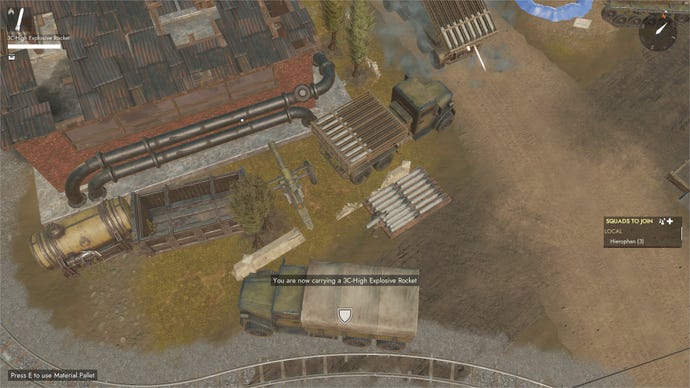
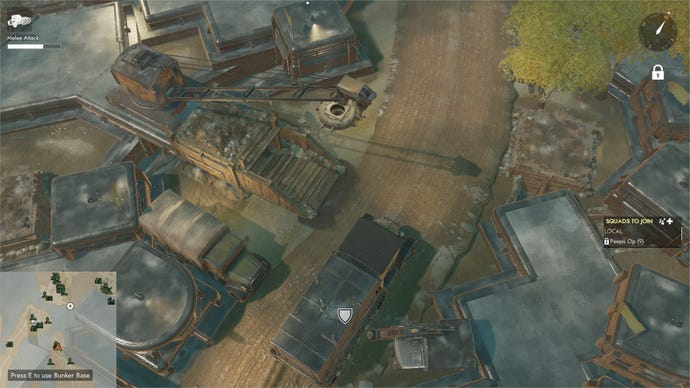
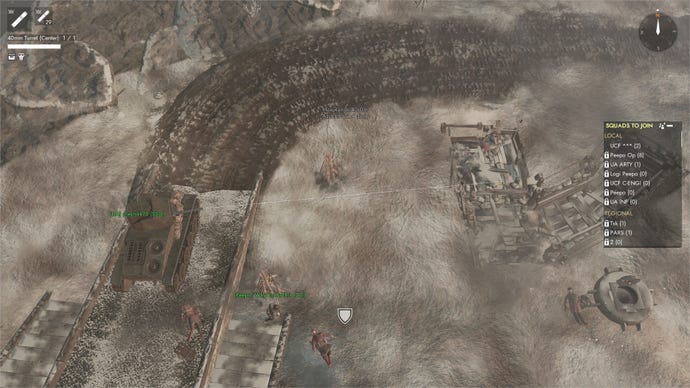
Oh, you can’t do everything, and you won’t get the credit for most of what you achieve. In fact, certain acts are disproportionately rewarded with in-game “commends”, essentially “likes” that players grant each other. Commends increase your rank, but beyond the first few they don’t affect anything else. Long term players will naturally gain rank over time, but there’s only a limited correlation between rank and competence. They also lead to some deeply tragic behaviour like a few people cynically swapping commends for nothing, or gaming the system to trigger a “commend player?” pop-up to multiple people, some of whom will click yes to be polite.
But that’s fine, because those commends are worthless, and it’s not like anyone can pull rank anyway. I’ve seen a Major abandon a truck full of explosives to the enemy, having failed not only to deny them, but also to arm himself and fight back, the miserable wretch.
So, you’ll get too much credit for some things, and none for others. And some of the most valuable work is utterly invisible. The esoterica: refilling fuel tanks, removing badly parked vehicles, building jeeps for public use, patrolling just in case. It’s a game where beyond the fun of combat, you need to derive satisfaction from doing helpful things without recognition. But it’s also a rare strategy game where the invisible things are no afterthought. Usually, those are abstracted into random numbers – the supertank’s unlikely defeat by a militia (in Foxhole, someone stole some mines from an enemy jeep), or the armour column’s failed advance (nobody refilled the big petrol can along their route) – but here they’re all things you can do, and arise organically as the design and player behaviour kiss and fight.
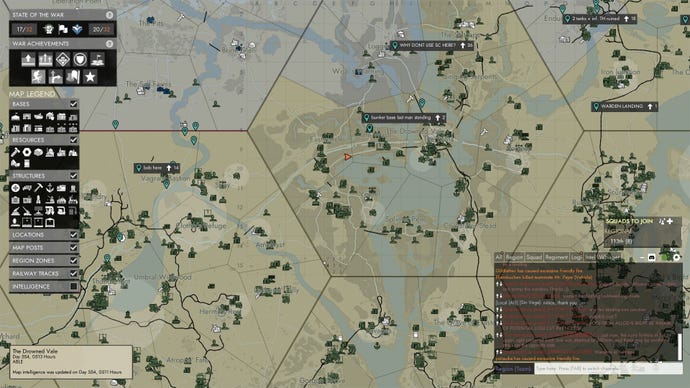
As in real life, the invisible work is everywhere, and thankless not because people don’t care (although some don’t). They just don’t know it exists, precisely because you did it. Anyone who’s studied public health could name fifty preventative measures that are not only unappreciated, but denounced by those too ignorant to appreciate the disasters they averted.
The irony is, in a game where the fighters get overlooked and truckers are lionised, it’s the latter who bask in the adulation while overlooking their own quiet batpeople. Too many of them don’t really get what good logistics are. Even ignoring that some are actually miners and manufacturers, there’s a worse problem: many in logi interpret “efficiency” only as “Make Number Go Up”. Jeep off small caches to protect every second line base the enemy could easily flank? No no, the efficient thing is to fill a freighter with a bajillion weapons and ship them to the port. It’s a better use of your time, see, because the number is bigger. Did anyone actually use them? Who cares!
It’s “efficient” in the way capitalism is: more stuff is produced, but it’s concentrated away from where it’s actually needed, achieving less in real human terms. It’s logistics as brute force, with no holistic administration. You might have done good logi because you moved thousands of crates, but meanwhile the depots are overflowing with empty guns and the bunkers with mismatched ammo because nobody’s connecting the dots or doing the small packages, making sure people get what they need.
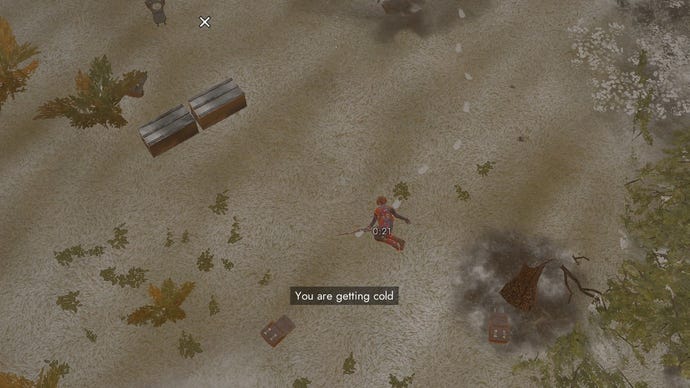
The last mile is famously the most inefficient in logistics, and the popular mistake is to devalue work whose value isn’t immediately obvious. But it’s how societies thrive, and how wars are won. Not by bulk alone, but by detail, and by contingency. One loaded rifle in a sentry’s hands is worth more than a hundred on a conveyor belt. Sometimes, too, you need to park the truck and be that soldier, efficiency be damned.
My side soundly lost my first war, thanks largely to our commitment to throwing everything, too late, into one or two places dictated by the enemy. I even had a few people argue that it was fine to have zero supplies in most spawnable bases (and three wars’ worth languishing in ports and depots) because regiments (clans) had private stockpiles for their own use. I wondered if they remembered me when the other team captured those stockpiles and used them against us.
It was frustrating to watch unfold, no doubt, but it also highlights how Foxhole presents a unique strategic challenge beyond moving supplies: How does a general strategise when stuck in the boots of a private? It’s not just a question of awareness, but of implementation. It’s a thought-provoking challenge, with multiple answers, best chosen by which you’d enjoy, because hey, it’s a game! Logically, the best shot at winning would require co-ordinating multiple regiments, and doing a ton of admin, labour, and real-world diplomacy. Healthier, perhaps, to work on a casual scale with a few friends, building a no-obligation network of contacts to team up with – which makes its very basic communication and organisation options a real shame, as even a simple friends list, or note system like EVE’s, would go a long way.
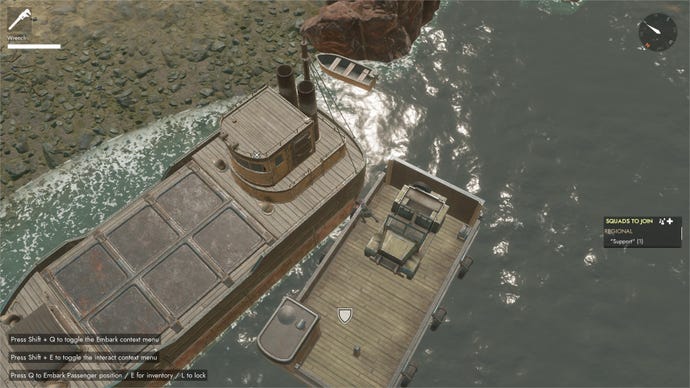
But what I love about Foxhole is that even as a solo player, you can strategise if you know your limits, and not to get too invested. You can’t order or control people, but you can convince, lead by example, and nudge the world. I have achieved nothing truly alone, but made a difference by clocking a problem and using someone else’s truck to fix it, by anticipating an enemy gambit and leaving the tools nearby for others to pre-empt it, by holding under fire. And because everyone contributes a little, everyone feels like they mattered.
Sometimes, picking your battles means accepting the limits of one person’s influence. Sometimes it’s to reason with your own side, and accept defeat. Can I talk everyone into not further fortifying the town that the enemy will obviously just go around to cut off the port road? Apparently not. But I can fortify that road, and carry gear to the three bases best placed to cover it. I’ve failed to convince the locals that those were organised recon probes, but I can patrol for a while and raise the alarm when the invasion lands. There are always other battles, other ways you can bridge the gap between your grand vision and your humble little soldier.
Foxhole is a choose-your-own-scope simulation, strategy not of command but of connection, where hopeless battles are often far more rewarding than nominally better outcomes. I knew I’d enjoy it, but I had no idea it would present such a fascinating strategic tapestry. You’ve put it off for far too long.
